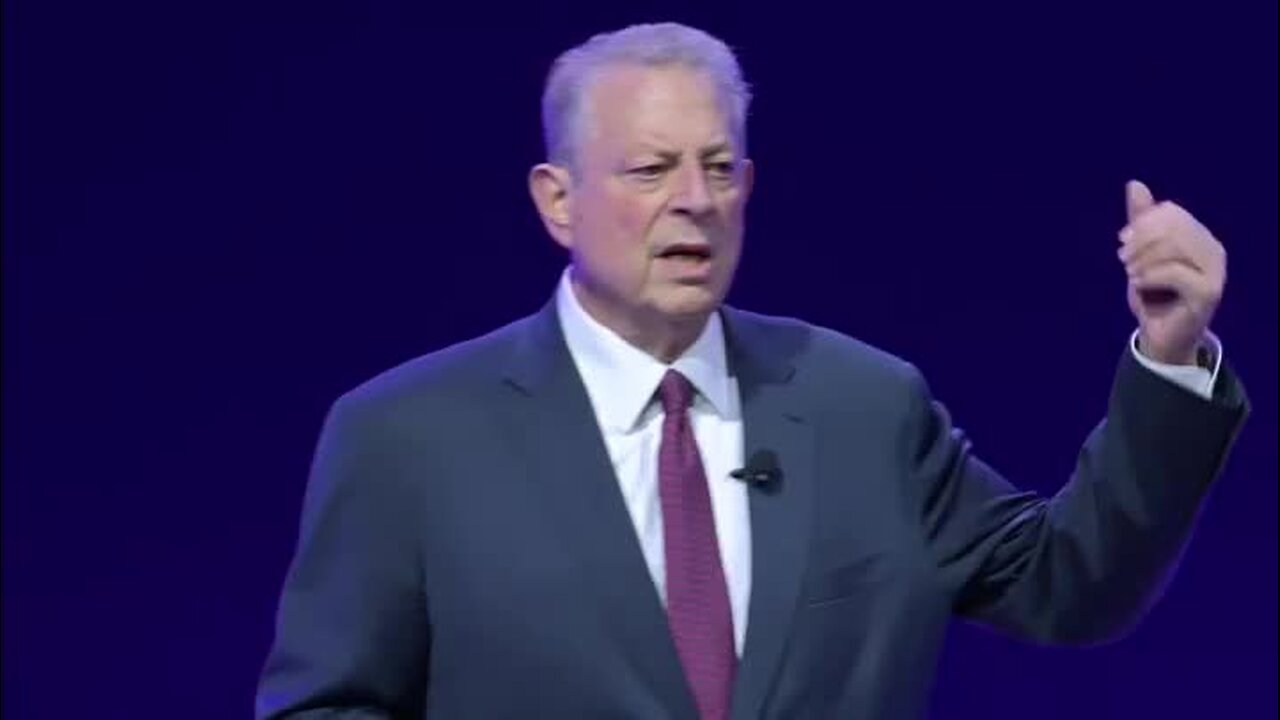Premium Only Content

Al Gore Gets Angry, Yells on Stage that Scientists Have Been ‘Dead Right’ About Climate Decades Ago: ‘I’ll Try to Calm Down’
GORE: “This is a NASA slide that measures — these two satellites measure gravity. It’s quite a clever experiment. But what it shows is, both the flooding events and the drought events are increasing simultaneously. And you can see the amplitude of each is getting larger as a function of the rising temperatures. And again, this is gonna get worse, too. The fact that the scientists who predicted all of this decades ago have been proven dead right should cause the rest of us to pay more attention to what they’re telling us now! Do we listen to the polluters, who don’t want to do anything meaningful that might reduce fossil fuels, or do we listen to the scientists who have been telling us what we need to do?
(Cheering and Applause)
This was a very extreme drought in China in the middle of this year, and what’s happening in the Amazon, the Rio Solimões, the Rio Negro, it’s the worst drought on record in the Amazon. 90% of the river flow in Colombia is gone, Ecuador’s losing it’s hydro because of this. In Namibia, and also Zimbabwe, they are now killing livestock — killing wild animals in order to help feed hungry people. How long are we going to let this get worse until we decide to take action?! I’m sorry, I press my own buttons these days.
(Applause)
And the more the temperature goes up and the more the drought gets worse, the more the fires spread and get worse. They doubled in the last 20 years. And this is — this year, this right now, really, in North America, it’s really quite a catastrophic situation. This is in the Amazon where they have had a record number of fires this year. This is the acropolis. Some of you may have seen this on the news, and the the prime minister of Greece says, ‘We’re at war. Climate crisis is already here.’ And the wildfires in Europe and the Mediterranean last year have been really catastrophic. The cost is going up as well $3.25 trillion in the last decade, that’s an increase of $600 billion over the previous decade. This, too, will get worse. When will we see — when we will decide that we don’t want to keep paying to clean up and try to heal the consequences and deal with the causes instead? Now, of course, you know the ice in the Arctic and Antarctic is melting. Greenland had temperatures earlier — last year, 28 degrees above normal. Greenland is now losing 30 million tons of ice every hour. During the hour that we’re in this room, 30 million tons will go from Greenland. That is fresh water coming off Greenland into the North Atlantic, where a key part of the ocean current circulation system is involved. It could be disrupted. Some scientists disagree, but more and more, they’re raising the alarm. And if you look at the bottom statement, these peer-reviewed — these scientists say in this peer-reviewed study, ‘We estimate a collapse around mid-century.’ What?! What?! Some of the load-bearing elements of our entire Earth ecological system are at risk. And what are we doing? Just talking away, talking away, not making much progress. Again, I’m getting stirred up here so I’ll try to calm down. I’m gonna hand it to Gavin here in a minute, he’ll maybe take the temperature down a little bit. Antarctica, where there is much more ice, you can see a steady accumulation, a steady rise of the amount of ice that is melting. The economists had this cover back in April, a $25 trillion dollar loss predicted by mid-century. In 25 years, 15% all the housing stock in the entire world at risk. Should that get our attention? When are we gonna wake up? When are we going to take action on this? River deltas are becoming salinated before the water comes over the shore. It invades the root zone. There are many agricultural river deltas that are being affected. But in lakes and inland Seas, like the Caspian, for example, the increased evaporation — there are other factors, but the levels are reducing in these inland Seas and lakes, and the Caspian is very much at risk. They are predicting another decline of up to 18 meters in this century, devastating the economies of the countries, including this one. And, of course it’s also an extinction and biodiversity crisis. So, here we are. Are we going to keep using this as an open sewer? We need to understand where it’s all coming from. That’s where climate trace comes in. You look, most of this global warming pollution stays below five kilometer. You can see, it’s so thin. That’s our open sewer. But you can’t pick out where it’s coming from from these kinds of measurements. You can only manage what you measure, and that is — we know the basic sectors, but we have not been able to identify exactly and precisely where it is coming from. That’s where Climate TRACE comes in, and each one of these columns here is a large polluting source. You can click on every single source in the entire world with Climate TRACE. We have a coalition of 11 members and we have more than 100 contributors, they — thousands of people are working to make Climate TRACE more and more effective every single month, and you can see the list of our contributors here.”
-
 1:41
1:41
Grabien
5 hours agoGutfeld on Jake Tapper’s New Book: ‘You Can’t Ignore CNN’s Role in the Cover-Up if You’re Writing a Book About the Cover-Up’
21 -
 LIVE
LIVE
Right Side Broadcasting Network
4 hours agoLIVE: President Trump and Ukrainian President Zelenskyy Meet and Hold a Press Briefing - 2/28/25
12,013 watching -
 LIVE
LIVE
The Charlie Kirk Show
1 hour agoTrump vs. Zelensky Reaction + The Epstein Misfire + Charlie vs. Newsom | Schimel, Marlow, Baller | 2.28
6,393 watching -
 55:05
55:05
The Dan Bongino Show
4 hours agoAmerica Is Back In The World Stage, And We Love To See It (Ep. 2433) - 02/28/2025
481K1.01K -
 49:29
49:29
The Rubin Report
3 hours agoDetails About Joy Reid’s Weeping Farewell No One Noticed with Co-Host Megyn Kelly
30.1K30 -
 15:36
15:36
Tactical Advisor
1 hour agoMUST HAVE AR15 Upgrades for Under $100
242 -
 DVR
DVR
Benny Johnson
2 hours ago🚨Epstein Files COVERUP EXPOSED: FBI Sabotaging Trump, DELETING Evidence?! | Tapes 'MISSING'?!
48.6K116 -
 59:29
59:29
Steven Crowder
4 hours agoCrafting Crowder's Comedy Gold | Behind the Scenes
172K91 -
 2:06:44
2:06:44
Tim Pool
3 hours agoTHE END OF THE WEST, Will We Survive Without Christianity? | The Culture War with Tim Pool
84.1K53 -
 2:01:13
2:01:13
LFA TV
16 hours agoBODYCAM FOOTAGE OF TRAFFIC STOP! | LIVE FROM AMERICA 2.28.25 11AM
33.7K17